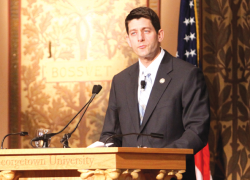
House Budget Committee Chairman Paul Ryan (R-Wis.) came under fire from both students and faculty during a speech on his “Path to Prosperity” budget plan at Georgetown U. Thursday.
Organized by the Georgetown Public Policy Institute, the speech was part of the annual Whittington Lecture, a series created to honor Leslie Whittington, a former dean of public studies in the Georgetown Public Policy Institute, who died in the 9/11 attacks.
In his speech, Ryan criticized the Obama administration for its spending increases and spoke about the severe consequences a large deficit could have on the nation’s economic future.
“The hallmarks of the president’s government-centered agenda are that policy after policy takes from hardworking Americans and gives to … special interests,” Ryan said.
Ryan’s plan aims to reduce the national deficit to below 3 percent of gross domestic product by 2015. Additionally, he said he would reduce the size of government to 20 percent of the overall economy by the same year.
To these ends, the Ryan plan reduces future funding to welfare programs, including Medicare, Medicaid, food stamps and Pell Grants.
Midway through Ryan’s speech, a group of students from Georgetown Occupy unfurled a banner over the Gaston Hall balcony that read “Stop the War on the Poor.”
Georgetown Occupy member Cole Stangler criticized Ryan’s cuts to welfare.
“Paul Ryan’s entire budget is class warfare in service of the 1 percent,” Stangler said. “He’s doing [their] dirty work.”
But Ryan, who frequently uses his Catholic faith to support his budget plan, said that it is Obama who has promoted class warfare through rhetoric about tax cuts and expressed hope that a new administration could solve the deficit problem.
“Only with the right leadership in place can we move forward with the idea of leaving our children with a stronger nation than the one our parents left us,” Ryan said.
After the lecture ended, the Georgetown Occupy members joined protesters from Catholics United, a nonprofit organization that promotes social justice found in Catholic teaching.
“As Catholics, we care about the less fortunate. We’re here to say, Paul Ryan does not speak for us,” Executive Director James Salt said.
Before Ryan’s arrival on campus, Fr. Thomas Reese, S.J., senior research fellow at the Woodstock Theological Center, crafted a letter challenging Ryan’s interpretation of Catholicism. The letter was signed by 90 faculty members across a variety of departments.
“Ryan has been talking so much about how Catholic social teaching inspired him and influenced the drawing up of his draconian budget,” Reese said. “I felt it was imperative that we respond and challenge him because we think he is totally misrepresenting and misusing Catholic social teaching.”
The letter confirmed Catholic social teaching’s commitment to helping the very poor and criticized Ryan for embodying the philosophical views of Ayn Rand rather than Catholicism.
“I think a lot of people don’t realize how far left a lot of the Catholic teachings of social and economic justice are,” Karen Stohr, a philosophy professor who signed the letter, said.
Reese clarified that the signatories do not object to Ryan’s presence on campus — only his budget plan.
“We welcome him to campus because it provides an opportunity to talk about Catholic social teaching and how moral and religious values should influence political decisions,” Reese said. “I think it’s a great opportunity to have a conversation, dialog, even an argument on campus about moral values and politics.”
